外研版(2019)选择性必修 第三册Unit 6 Nature in words Listening & Speaking课件(共19张PPT)
文档属性
| 名称 | 外研版(2019)选择性必修 第三册Unit 6 Nature in words Listening & Speaking课件(共19张PPT) | 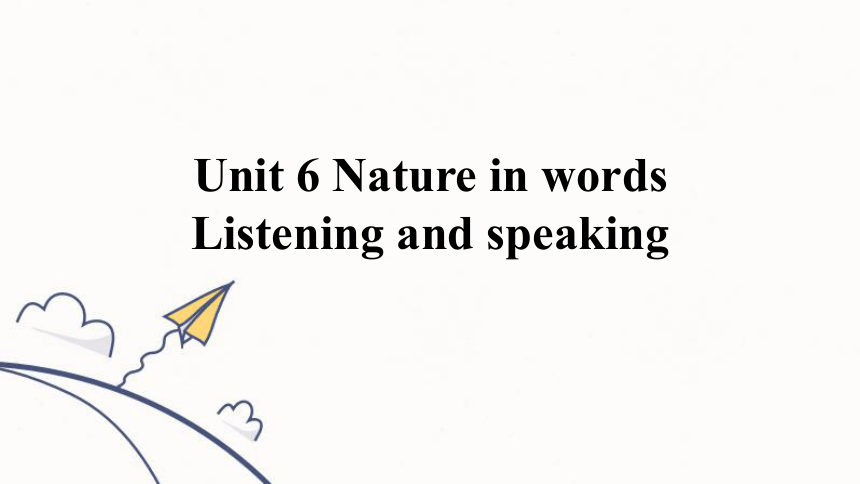 | |
| 格式 | pptx | ||
| 文件大小 | 10.1MB | ||
| 资源类型 | 教案 | ||
| 版本资源 | 外研版(2019) | ||
| 科目 | 英语 | ||
| 更新时间 | 2025-04-26 19:45:16 | ||
图片预览


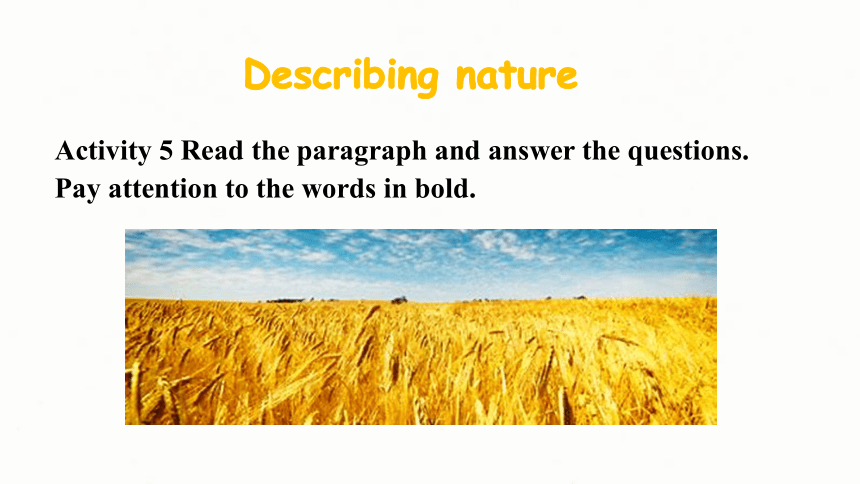
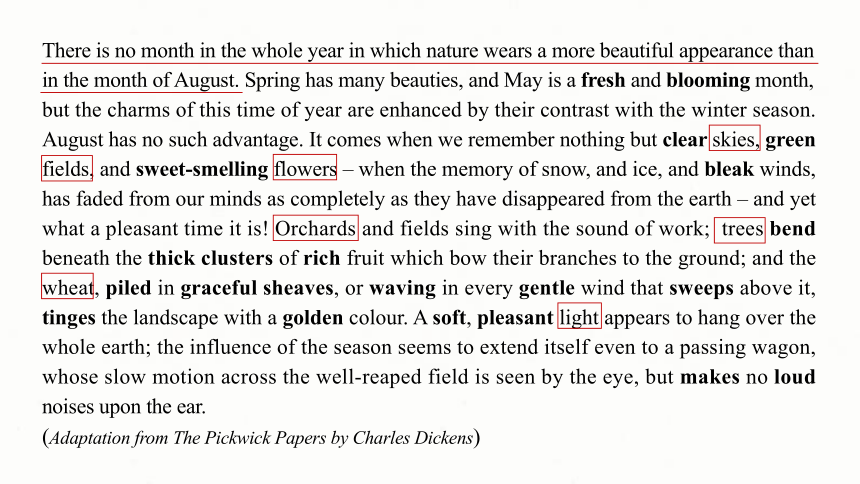
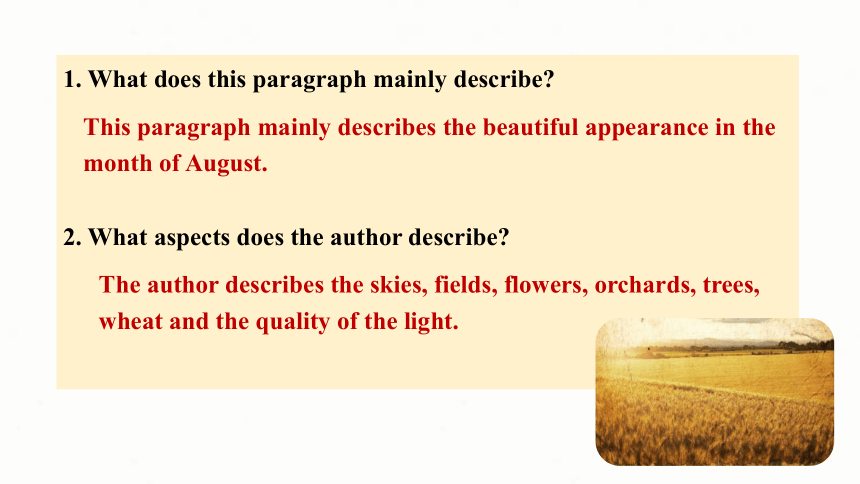
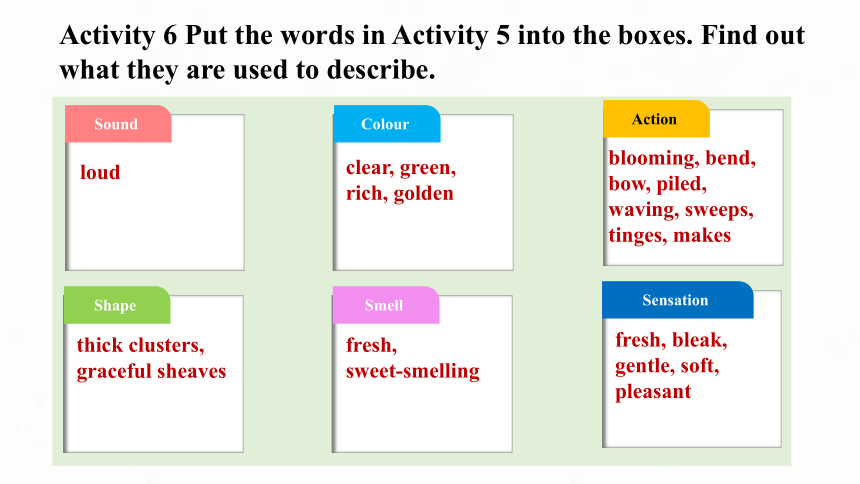
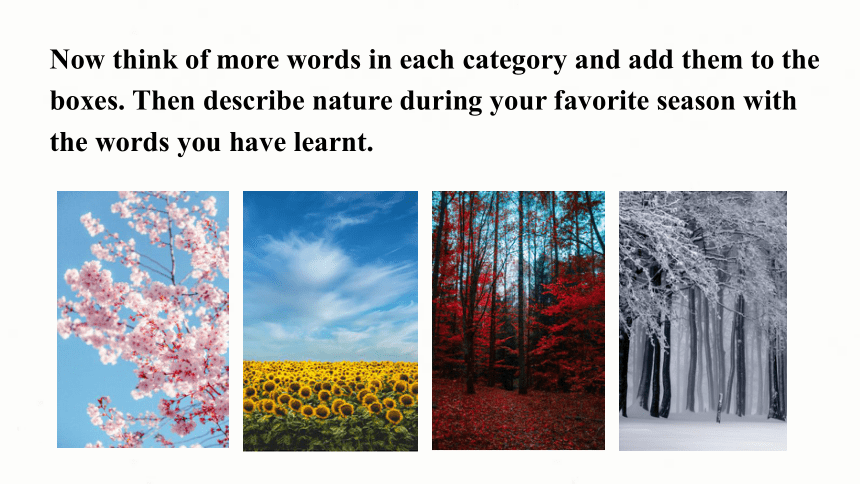
文档简介
(共19张PPT)
Unit 6 Nature in words
Listening and speaking
By the end of this class, students are expected to:
① learn and apply words that describe nature. Categorize the words according to their sounds, colors, actions, shapes, smells, and senses;
② listen to the conversation and learn to give examples and explanations.
Learning objectives
Activity 5 Read the paragraph and answer the questions. Pay attention to the words in bold.
Describing nature
There is no month in the whole year in which nature wears a more beautiful appearance than in the month of August. Spring has many beauties, and May is a fresh and blooming month, but the charms of this time of year are enhanced by their contrast with the winter season. August has no such advantage. It comes when we remember nothing but clear skies, green fields, and sweet-smelling flowers – when the memory of snow, and ice, and bleak winds, has faded from our minds as completely as they have disappeared from the earth – and yet what a pleasant time it is! Orchards and fields sing with the sound of work; trees bend beneath the thick clusters of rich fruit which bow their branches to the ground; and the wheat, piled in graceful sheaves, or waving in every gentle wind that sweeps above it, tinges the landscape with a golden colour. A soft, pleasant light appears to hang over the whole earth; the influence of the season seems to extend itself even to a passing wagon, whose slow motion across the well-reaped field is seen by the eye, but makes no loud noises upon the ear.
(Adaptation from The Pickwick Papers by Charles Dickens)
1. What does this paragraph mainly describe
This paragraph mainly describes the beautiful appearance in the month of August.
2. What aspects does the author describe
The author describes the skies, fields, flowers, orchards, trees, wheat and the quality of the light.
Activity 6 Put the words in Activity 5 into the boxes. Find out what they are used to describe.
Sound
Colour
Action
Shape
Smell
Sensation
loud
clear, green, rich, golden
blooming, bend, bow, piled, waving, sweeps, tinges, makes
thick clusters, graceful sheaves
fresh,
sweet-smelling
fresh, bleak, gentle, soft, pleasant
Now think of more words in each category and add them to the boxes. Then describe nature during your favorite season with the words you have learnt.
Do you know the book Landmarks by Robert Macfarlane
Words are grained细化 into our landscapes, and landscapes are grained into our words. Landmarks is about the power of language to shape our sense of place.
It is a field guide to the literature of nature, and a glossary containing thousands of remarkable words used in England, Scotland, Ireland and Wales to describe land, nature and weather. Travelling from Cumbria to the Cairngorms, and exploring the landscapes of Roger Deakin, J. A. Baker, Nan Shepherd and others, Robert Macfarlane shows that language, well used, is a keen way of knowing landscape, and a vital means of coming to love it.
Open a dictionary, and you’ll be surprised to find that there are many more words about nature than you would think. There are various ways to describe the things we see in the natural world, no matter whether it’s a flower, an animal or the rain. For example, there are many ways to describe the different sounds of birds, such as chatter, chirp, cluck, hoot and tweet. These words can help us to write vivid descriptions of nature.
Activity 7 Listen to the conversation and answer the questions.
1. What book was the man reading
The man was reading a book called Landmarks.
2. Why was the man annoyed
We’re losing old words all the time.
3. What was the girl’s opinion
Times change.
Activity 8 Listen to the conversation again and correct the mistakes in the man’s blog.
Eric’s blog
Recently I was reading a book called Landmarks by Robert Macfarlane. What the author wrote made me feel confused.
annoyed
He said that many words describing nature were being added to the new version of the junior dictionary.
These are words like “pasture” and “bluebell”. A “pasture” is
a dense forest for cows and horses to eat. “Bluebells” are fruit shaped like bells.
now missing from
field of grass
blue flowers
blog
The reason why they are doing this is that they think these words are irrelevant to children, so instead they’ve replaced them with terms like “film”. Perhaps the dictionary does have a point, because most children don’t get out into nature that much nowadays.
history
They spend all their time watching TV instead. But it’s a pity. In my opinion, these words form part of our literature. They add colour to our lives, and shouldn’t be lost. My granddaughter has the same opinion as me.
a different opinion from
much of their time on computers
She says we are losing old words all the time. And as times change,
old words become as normal to young people as the new ones are to me.
new words become as normal to young people as the old ones are to me
Now work in pairs and act out the conversation.
Activity 9 Complete the boxes with the expressions from the conversation.
… such as …
The main reason
…, for instance
Two reasons, I think.
Consider…
Giving examples
Giving explanations
… such as …
…, for instance.
The main reason …
Two reasons, I think.
Consider …
Activity 10 Talk about your opinions of the issue discussed in Activity 8 using the expressions in this section.
In my opinion, which words should be added to a dictionary depends on the dictionary editors. The main reason is that the dictionary editors study the language as it's used. They carefully monitor which words people use most often and how they use them.
For instance, each day most Merriam-Webster editors devote an hour or two to reading a cross section of published material, including books, newspapers, magazines, and electronic publications. The editors scour the texts in search of new words, new usages of existing words, variant spellings, and inflected forms–in short, anything that might help in deciding if a word belongs in the dictionary, understanding what it means, and determining typical usage. Any word of interest is marked, along with surrounding context that offers insight into its form and use. So it’s no use for ordinary people in talking about this issue.
Now think about your performance. Have you actively participated in the discussion What can you do to improve your performance
Unit 6 Nature in words
Listening and speaking
By the end of this class, students are expected to:
① learn and apply words that describe nature. Categorize the words according to their sounds, colors, actions, shapes, smells, and senses;
② listen to the conversation and learn to give examples and explanations.
Learning objectives
Activity 5 Read the paragraph and answer the questions. Pay attention to the words in bold.
Describing nature
There is no month in the whole year in which nature wears a more beautiful appearance than in the month of August. Spring has many beauties, and May is a fresh and blooming month, but the charms of this time of year are enhanced by their contrast with the winter season. August has no such advantage. It comes when we remember nothing but clear skies, green fields, and sweet-smelling flowers – when the memory of snow, and ice, and bleak winds, has faded from our minds as completely as they have disappeared from the earth – and yet what a pleasant time it is! Orchards and fields sing with the sound of work; trees bend beneath the thick clusters of rich fruit which bow their branches to the ground; and the wheat, piled in graceful sheaves, or waving in every gentle wind that sweeps above it, tinges the landscape with a golden colour. A soft, pleasant light appears to hang over the whole earth; the influence of the season seems to extend itself even to a passing wagon, whose slow motion across the well-reaped field is seen by the eye, but makes no loud noises upon the ear.
(Adaptation from The Pickwick Papers by Charles Dickens)
1. What does this paragraph mainly describe
This paragraph mainly describes the beautiful appearance in the month of August.
2. What aspects does the author describe
The author describes the skies, fields, flowers, orchards, trees, wheat and the quality of the light.
Activity 6 Put the words in Activity 5 into the boxes. Find out what they are used to describe.
Sound
Colour
Action
Shape
Smell
Sensation
loud
clear, green, rich, golden
blooming, bend, bow, piled, waving, sweeps, tinges, makes
thick clusters, graceful sheaves
fresh,
sweet-smelling
fresh, bleak, gentle, soft, pleasant
Now think of more words in each category and add them to the boxes. Then describe nature during your favorite season with the words you have learnt.
Do you know the book Landmarks by Robert Macfarlane
Words are grained细化 into our landscapes, and landscapes are grained into our words. Landmarks is about the power of language to shape our sense of place.
It is a field guide to the literature of nature, and a glossary containing thousands of remarkable words used in England, Scotland, Ireland and Wales to describe land, nature and weather. Travelling from Cumbria to the Cairngorms, and exploring the landscapes of Roger Deakin, J. A. Baker, Nan Shepherd and others, Robert Macfarlane shows that language, well used, is a keen way of knowing landscape, and a vital means of coming to love it.
Open a dictionary, and you’ll be surprised to find that there are many more words about nature than you would think. There are various ways to describe the things we see in the natural world, no matter whether it’s a flower, an animal or the rain. For example, there are many ways to describe the different sounds of birds, such as chatter, chirp, cluck, hoot and tweet. These words can help us to write vivid descriptions of nature.
Activity 7 Listen to the conversation and answer the questions.
1. What book was the man reading
The man was reading a book called Landmarks.
2. Why was the man annoyed
We’re losing old words all the time.
3. What was the girl’s opinion
Times change.
Activity 8 Listen to the conversation again and correct the mistakes in the man’s blog.
Eric’s blog
Recently I was reading a book called Landmarks by Robert Macfarlane. What the author wrote made me feel confused.
annoyed
He said that many words describing nature were being added to the new version of the junior dictionary.
These are words like “pasture” and “bluebell”. A “pasture” is
a dense forest for cows and horses to eat. “Bluebells” are fruit shaped like bells.
now missing from
field of grass
blue flowers
blog
The reason why they are doing this is that they think these words are irrelevant to children, so instead they’ve replaced them with terms like “film”. Perhaps the dictionary does have a point, because most children don’t get out into nature that much nowadays.
history
They spend all their time watching TV instead. But it’s a pity. In my opinion, these words form part of our literature. They add colour to our lives, and shouldn’t be lost. My granddaughter has the same opinion as me.
a different opinion from
much of their time on computers
She says we are losing old words all the time. And as times change,
old words become as normal to young people as the new ones are to me.
new words become as normal to young people as the old ones are to me
Now work in pairs and act out the conversation.
Activity 9 Complete the boxes with the expressions from the conversation.
… such as …
The main reason
…, for instance
Two reasons, I think.
Consider…
Giving examples
Giving explanations
… such as …
…, for instance.
The main reason …
Two reasons, I think.
Consider …
Activity 10 Talk about your opinions of the issue discussed in Activity 8 using the expressions in this section.
In my opinion, which words should be added to a dictionary depends on the dictionary editors. The main reason is that the dictionary editors study the language as it's used. They carefully monitor which words people use most often and how they use them.
For instance, each day most Merriam-Webster editors devote an hour or two to reading a cross section of published material, including books, newspapers, magazines, and electronic publications. The editors scour the texts in search of new words, new usages of existing words, variant spellings, and inflected forms–in short, anything that might help in deciding if a word belongs in the dictionary, understanding what it means, and determining typical usage. Any word of interest is marked, along with surrounding context that offers insight into its form and use. So it’s no use for ordinary people in talking about this issue.
Now think about your performance. Have you actively participated in the discussion What can you do to improve your performance
